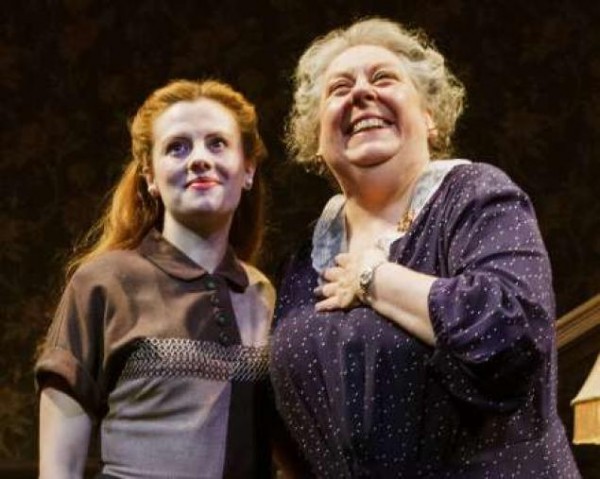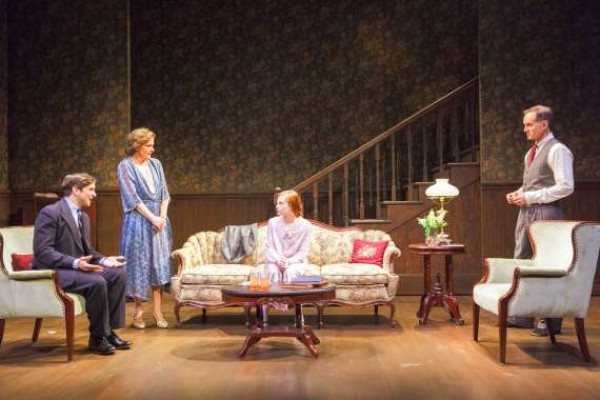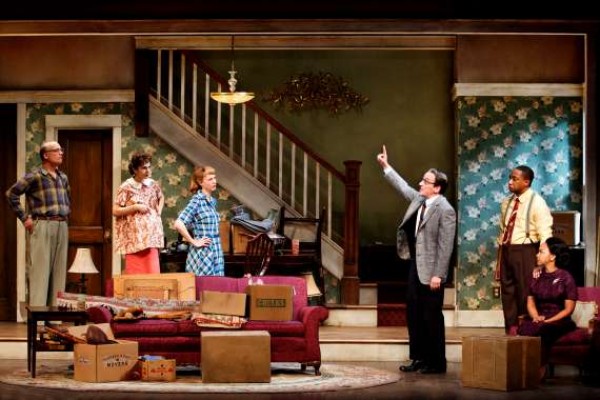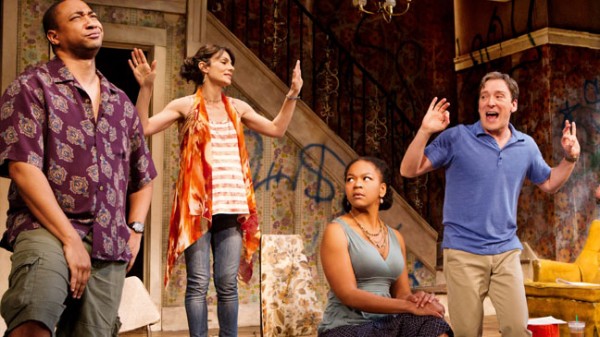Primary Stages, 59E59 Theaters
59 East 59th St, between Park & Madison Aves.
Tuesday – Sunday through September 15, $30-$70
212-279-4200
www.59e59.org
Texas-born playwright and screenwriter Horton Foote, who died in 2009 at the age of ninety-two after a long, fruitful career, had an uncanny knack for capturing the inherent beauty and heartbreak of American life, putting realistic characters in believable situations, just going through their daily chores of merely existing. He is best known for such films as Tender Mercies and To Kill a Mockingbird (for which he won an Oscar for Best Adapted Screenplay) and such plays as The Trip to Bountiful, the Pulitzer Prize-winning Young Man from Atlanta, and the three-part “Orphans’ Home Cycle.” His intoxicating slice-of-life Americana is currently on view in Harrison, TX, a compilation of three short works, ably directed by Pam MacKinnon (Clybourne Park), that have been brought together at Primary Stages. Blind Date is set in Harrison in 1928, on the cusp of the Great Depression, as pouty sourpuss Sarah Nancy (Andrea Lynn Green) has been sent to live with her aunt Dolores (Hallie Foote, one of Horton’s daughters) and uncle Robert (Devon Abner). Sarah Nancy is a mopey, bored young woman who’d rather hang out in her room than have to talk to anyone, especially young men, but Dolores is determined to get her a boyfriend and has thus set him up with Felix (Evan Jonigkeit), a local insurance salesman who is due to show up any minute. Dolores tries to coach Sarah Nancy on how to be a better conversationalist while also attempting to take care of her rather hapless husband, but when Felix arrives, things go a bit crazy.

Andrea Lynn Green and Jayne Houdyshell think of the good times in Horton Foote’s THE MIDNIGHT CALLER
In The One-Armed Man, also set in 1928, an angry former employee, McHenry (Alexander Cendese), is demanding to see his old boss, C. W. Rowe (Jeremy Bobb), so he can get back the arm he lost in an accident, but Rowe seems more intent on railing on about his personal success to his accountant, Pinkey (Abner). Rowe offers McHenry five dollars to go away, but it’s going to take a lot more than money to make things straight. The third play, The Midnight Caller, is set nearly a quarter-century later, but it feels like Harrison hasn’t changed a bit as a trio of gossipy women — judgmental chatterbox Alma Jean Jordan (Mary Bacon), “Cutie” Spencer (Green), and older teacher Miss Rowena Douglas (Jayne Houdyshell) — debate the upcoming arrival of Helen Crews (Jenny Dare Paulin), a woman with a reputation who is moving into their boarding house after being thrown out by her mother for her questionable activities. When a stranger, Ralph Johnston (Bobb), also shows up looking for a room, the situation gets a lot more complicated. Unfortunately, the eventual appearance of Helen’s former flame, Harvey Weems (Cendese), severely detracts from the play, which is otherwise sweet and engaging. In the first and third works, Foote’s snappy down-home dialogue is the centerpiece, adding beautiful, funny, poetic language to the relatively simple goings-on, with characters that are easy to warm to, especially Miss Rowena, who looks out the window, remembering what it was like as a child gazing out at the fireflies. The middle piece is far more abrupt and shocking, providing a strong counterpoint that would have felt significantly out of place had it started or finished the trio of plays. Taken together, the three pieces, running approximately one hundred minutes and performed without an intermission, offer a fascinating examination of an old-time America that might not be quite as far away as one might imagine. (Harrison, TX runs through September 15 and will be followed at Primary Stages by Him, a new play by another of Foote’s daughters, Daisy Foote.)


